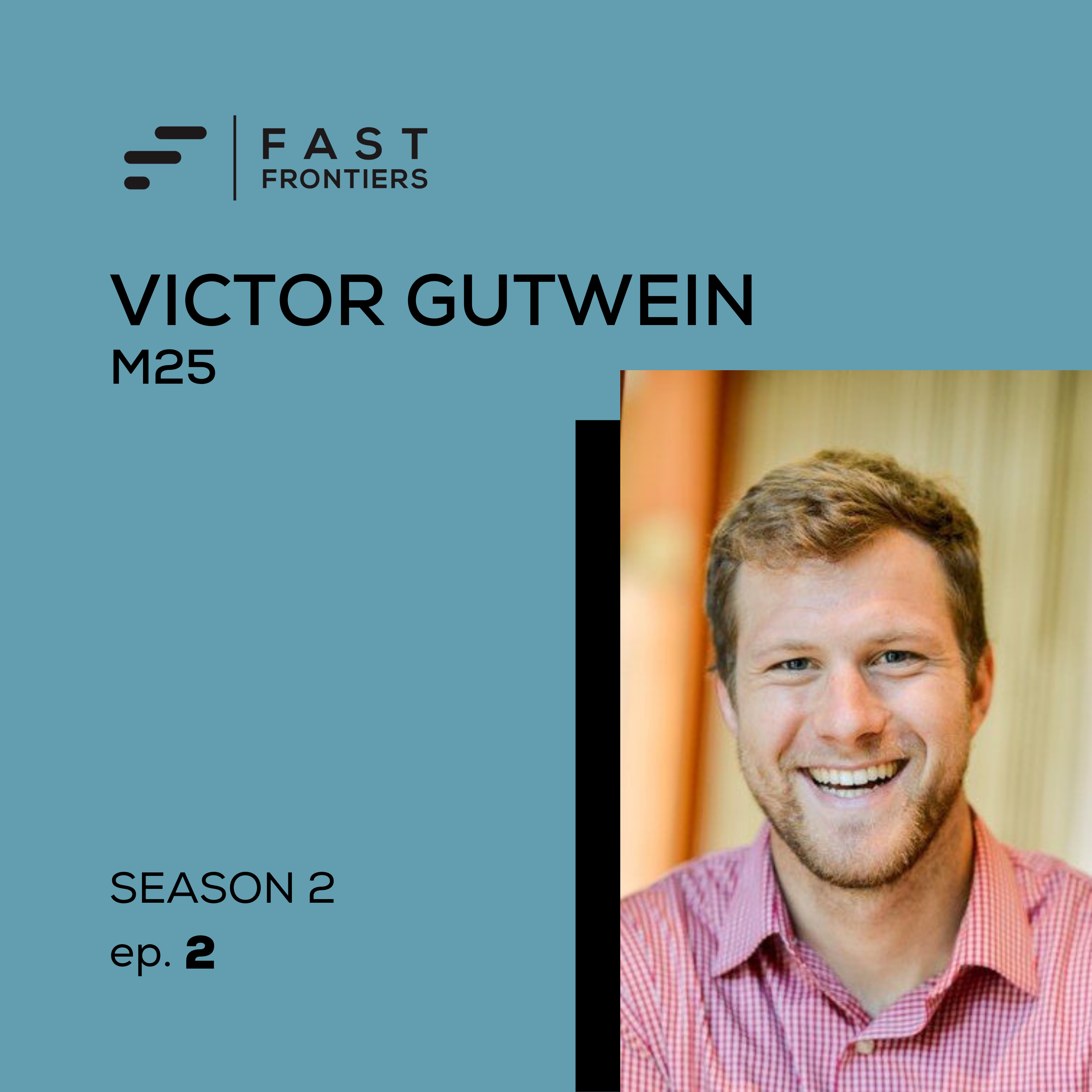S2 Ep 2. Victor Gutwein: M25
- 0.5
- 1
- 1.25
- 1.5
- 1.75
- 2
Tim Schigel: Okay, welcome to Fast Frontiers. I am your host, Tim Schigel, Managing Partner of Refinery Ventures. In this episode, we're bringing you my conversation with Victor Gutwein, Founder and Managing Partner at M25 in Chicago, Illinois. In this episode, we're going to dive into three different areas. One is Victor's motivation for creating M25, which was really addressing a gap in the Midwest landscape regarding access to capital, particularly pre-seed, seed and later seed stages. Second, we'll look at their access and activity across the region, which includes investments in 24 cities and the snowball effect that happens once you make an investment in a city and a community and how that spreads. And finally, the many ways that M25 is fostering community with Midwest founders, with their summit conferences, their midweststartups.com for boomerang talent and Club 25. Please enjoy my conversation with Victor Gutwein. All right, today on the show we have with us, Victor Gutwein, who's the Founder and Managing Partner of M25 Ventures, a Chicago- based firm that's been the most active early-stage firm in the Midwest in the last few years, with over 90 portfolio companies and counting by the minute. We'll provide an update there to celebrate a milestone in a few minutes. Victor is also a member of an upcoming Kauffman Fellows class. And for anybody out there who follows venture capital, they know that Kauffman Fellows Program is a tremendous program, great program to go through and really a high-quality badge of honor, if you will, that Victor will have after going through that program. Prior to M25, Victor was the youngest member of Hyde Park Angels, where he led the Consumer Product Team and also was one of the founding members of the University of Chicago student-run venture fund. So welcome, Victor.
Victor Gutwein: Thanks, Tim. I'm really excited to be here. I've enjoyed our friendship over the years and excited to be on this podcast with you.
Tim Schigel: It's great to have you. In terms of full disclosures, we should say that we have, I believe, two investments in common, Winston Privacy and Astronomer.
Victor Gutwein: Exactly.
Tim Schigel: Those companies are both doing really well, but you have quite a background in doing some, I think, great things from a seed perspective throughout the Midwest. So first of all, why don't you, if you could, just share where the motivation for M25 came from and what kind of investing you're doing on behalf of M25.
Victor Gutwein: Thanks, Tim. So the early days of M25 were inspired because of seeing a gap in the Midwest landscape for the access to risk capital. There's not a lot of people that have made money in tech startups across the region. There's not a lot of density of early-stage venture capital firms. And in order to raise capital, particularly we see the pre-seed, seed and later seed stages. That can be pretty sparse. That's hard to attract capital from further afield. The coastal markets have a difficulty of accessing deal flow and accessing building relationships with founders here. We see that as an opportunity. And that's what I saw when I started M25 in 2015. I had been looking at the landscape for venture capital, talking to a bunch of VCs, talking to a bunch of founders and really wanted to start something where I saw a market gap. That was the reason why M25 came to be. I had initially pulled together some friends and family to build a tiny, tiny fund. We raised a million dollars. I went full time. I left my corporate job. I was at Walgreens on the Strategy Team before then. I left my corporate job and decided to start investing across the region. With that first fund, we made 21 investments. They were tiny investments, but built up a little bit of a reputation, started sourcing a lot of deals. I started becoming very active, including with some Angel groups, like Hyde Park Angels. Then raised our second fund. That's when my partner, Mike, joined us. We raised $11 million from individuals, family offices across the region and that fund lasted us for three years. We continue to make follow-on investments out of that. But now we're investing out of our next fund, where we've raised $20 plus million dollars so far and are investing a little bit larger check, but it's still the same thesis, same region, still early- stage, pre-seed tech deals across here that we've been able to now lead and co-lead and work with some great investors like you guys.
Tim Schigel: Talk a little bit more about what is the gap, other than the capital, what's the differentiator gap that you're trying to address and bring to the table?
Victor Gutwein: What we've seen is there are some very common issues that early-stage startups face, whether you're in Chicago or Cincinnati or St. Louis. We have built up an ability that if we're on your cap table, we can help fill some of these gaps. The first one is usually capital connections. We know it's generally a warm relationship game. Whether you like it or not, that is how venture capital investing is played. So we try to be that bridge to really help our companies raise money as they grow, providing guidance, coaching and lots of connections, because it really is a sales process. You have to talk to a lot of investors to raise money. The second thing we see is just the lack of access to talent that is, particularly, is looking for a job within tech and within a startup. The Midwest maybe isn't known for having the long, long history of tech success and so it's not as ingrained in our culture to work at a tech company. We are trying to surface people, both within the Midwest and maybe boomerang candidates, to work at our companies. We do that partially through a website called midweststartups.com. We do a lot of blogging and content, but also source a lot of candidates and profiles and post jobs that are available in our startups. The last thing that we really have found is there is a lack of density, just by nature of the Midwest and the ecosystem, with so many cities that have interesting startup activity. This isn't California, with LA and SF. This isn't the East Coast, with New York and Boston. This is a region where we're seeing unicorns come out of so many cities. There's a lot of interesting opportunities when you look at the region, but there's not a lot of founders on every block. You don't go to the coffee shop like you do in South Park and see a whole bunch of founders talking to each other, where you can just get advice and have those relationships with somebody else who's running a tech company. Instead, we found that we are, with our huge portfolio, acting as a bridge and a community for our founders, which we call Club M25. If you've invested, you're in the club. We have built these bridges. We built these people that are acting as advisors connecting to potential customers, other investors. Maybe if one company is going through a layoff, that talent can maybe he picked up by another company. And that has been huge part of our investment and that makes us a really good syndication partner, too because we can just provide some additional network across those three themes that we focus on.
Tim Schigel: I assume your summits are part of the capital connections, maybe not exclusively, and I've been able to attend. Thanks for inviting me and very well run. A lot of great folks. A lot of great energy. Tell me more about how the summits came to be and what's involved and some of the successes that have come out of that.
Victor Gutwein: Tim, we're super glad you were able to participate and hope to have you and everyone in the future. But our summits have been, they actually started off on that third leg with focusing on founder community and have grown to be bigger with capital connections, because it's a little bit of both. We started off, it was just a place for our founders to get together, learn from each other, have a few panels, have some interaction, a lot of social activity to build those relationships. Most of them are not in the same city. Then we started to invite investors and that's where really where it scaled. We had at the last summit, I think we had 150 VCs. It's firms that are in Cincinnati and Indianapolis and Chicago, but it's also firms from Boston, New York and SF in LA. We're able to get that mingling that happens naturally. Then we also do very intentional, double opt-in, one- on- one meetings, where we've had 70 of our portfolio companies there. They're looking at all the investors and they're selecting who they'd like to meet with. Then the investors do the same thing. A little bit like a Tinder match. If they both swipe right, then they're both going to be connected. They can have a half-hour meeting together. And we set up at the last one, we had 500 one- on- one meetings, where they were double opt-in. That has led to investment in our companies. Whether it's at the seed stage or the Series B stage, we have gotten capital to our companies because of that. Investors, apparently like yourself, have really enjoyed it because the chance to find new opportunities, but also to connect with others that are interested in the same thing. So that has grown. Now it's the largest gathering of VCs in the Midwest. We hope to continue that. Of course, this year we had to do a digital version, this fall, and that worked well. We can't wait till we can bring that same energy back in person once that's possible. That's been a cornerstone part of our value add since we started the summits.
Tim Schigel: That's amazing. I hope that continues to go well and gets larger. But speaking of that, what's your strategy for covering all these different cities that are, they're not just an hour away from each other, right? There's quite a bit of distance. How do you manage that?
Victor Gutwein: It turns out we are the most active investor in Illinois, where I live. But also the most active investor in Nebraska, which is, that's a seven or eight-hour drive from where I live. We do a significant amount of travel. Now, that's been cut pretty dramatically lately. But we are very intentional about being in those communities and building the relationships with the people that are in the startup ecosystem. It's founders, it's community champions, it's co-investors, accelerators, universities, lawyers and service providers that we've built up relationships with. They are vital for not just the deal flow, but also referring and getting the references on how compelling the opportunity is. So much of this is about the team early on. These are companies that may be pre-revenue, or usual early revenue, but it's so much to know about, hey, what type of pedigree or track record does this founder bring to the table? Have they tapped into some of the resources that are available in the community? Are they well referenced? Or, are they known con artists that are just trying to tip over the person from Chicago for their money? So that is vital. Now, that we've done that, we visit these cities regularly. We've built those relationships. We've invested in 24 cities now across the region. Many of them multiple times. I made five investments to date in the Cincinnati Metro area. That's continuing to build. It's really a snowball effect, because when you make one investment, when you're active in a community, then you start to see other opportunities. And maybe those ones were, initially, something wasn't stealth or something wasn't really being actively pitched or it's that serial founder that was thinking about not taking on capital, but is having that one meeting and he'll talk to M25 now. That's the opportunity that we're hoping to really tap into, because remember, we go early, before they're listed on a Pitchbook or Crunchbase. We're really trying to surface these opportunities.
Tim Schigel: I think that's so smart. In my experience, what I've seen is that there really aren't that many investors that are willing to travel and show up in those regions or cities on a regular basis, where entrepreneurs know who they are. But the ones who do, to your point, the entrepreneurs know. They're much higher brand awareness for your firm if you do that. It's not really a high bar. You just have to plan it. You said, be intentional about it. It's one of the reasons we book out, we map out our year, the whole calendar year, a year in advance so we can take the time to make sure we schedule those trips. Otherwise, they won't happen. This is perfect for Fast Frontiers. You're accelerating innovation in surprising places. And one of those is Nebraska. Let's dig in a little bit more on Nebraska. Tell us, why Nebraska? What's happening in Nebraska? What are the five companies in Nebraska?
VIctor Gutwein: Nebraska is such an interesting place because it has half the population of nearby Iowa and all of its population is basically in two cities, Lincoln and Omaha. Other than Berkshire Hathaway, it's really just known as this ag heartland state. But it actually has some very exciting companies. You've probably have heard of Hudl, which has just grown really, I think, hundreds of million dollars in valuation at this point, with a strong investor in Excel. But you've also may not have heard of Spreetail, which is even bigger and it's a rapidly growing e-commerce company. They've actually already had some reasonably exciting success in that ecosystem. You have Invest Nebraska, which is among the most active economic development-oriented investors, so state-backed investors. It puts things like CincyTech and Rev1 and Elevate Ventures, it can go right up against those as being active and supportive and finding and helping those companies that are coming out of the state. We've invested in five to date and are always looking at more. We have Breeze, which is in Omaha, as well as Fanbox and OpsCompass are also in Omaha. OpsCompass just raised a six and a half million dollars Series A just a year after we invested. These are quality companies. Then we have Four Stars and Opendorse in Lincoln. So both of those communities, we've found a lot of opportunities and there's more that we've gotten really close to or we're still tracking. It's an interesting opportunity. It's not a huge population, but they've done some things right. It doesn't really pop up on most people's radar. Cincinnati has more startups, has had some bigger opportunities, of course. Omaha and Lincoln are very impressive. We make it a point to spend time out there every year or two. And it has now a pretty robust portfolio.
Tim Schigel: You're doing a lot of great scouting work for those Series A funds and beyond, I'm sure, are not visiting there and helping them connect and do some of that vetting and screening for them. What percentage of your companies have gone through some accelerator program with some of the Techstars or a Gener8tor or someone like that?
Victor Gutwein: That's a great question. I don't know if I have the exact percent. It's very common, though. In particular for a founder that has not gone through a prior exit, I think it's the vast majority of those founders. It'd be very rare for a non-experienced tech founder to not have gone through some sort of accelerator program. We've even had experienced founders go through. For example, we backed a company called Pear Commerce. That company, where two of the founders of EatStreet, which was, I think it was at one point the fifth largest online ordering company in the United States, have raised over $40 or $50 million in venture capital. Those two founders decided to go through Brandery here in Cincinnati because of how vibrant that network you could tap into could help their next company, Pear Commerce. That's relatively rare. Most time a unexperienced founder is not going through an accelerator, unless maybe it's a corporate accelerator, but with some specific relationships they're trying to build. But we still see maybe for 90% of the founders that are relatively inexperienced, have not done a tech startup before. It's the Gener8tor network. It's the Techstars network. Those are probably the two biggest for our portfolio. We've had several go through YC or 500 Startups, as well. They're going through national programs or regional programs and having some success with that.
Tim Schigel: You are approaching a significant milestone in terms of number of companies, drum roll, please.
Victor Gutwein: We have just done our hundredth company since launching in 2015. That's a pretty exciting place to be. You think about how much our business has changed in the past five years, how active that means we have been, averaging 20 companies a year, almost two a month. It means that we've seen a lot of deals. We may have some of the best metrics around what does a company need to hit to get this certain valuation? What does this company need to do at this stage? We have a lot of comps, especially if you put it in the fact that for every deal we do, we usually see about a hundred. That ratio is also pretty, pretty exciting. That's been our, where we're at. I don't know what the next hundred are going to look like, but we are excited about what we've done, but super excited about where we're still going.
Tim Schigel: After five years and a hundred companies, if you could summarize, what are the top three lessons learned that you've experienced or observed? And how does that change how you think of the next five years?
Victor Gutwein: To condense them down to three, because I've learned so much, I've had to adapt so much, is difficult. There's a few that come to mind. One is just for, more on us investing, the importance of investing initially at the right valuation for the stage of company. We don't want to be predatory. We don't want to be punitive on valuation. That's not the point. But the point is that if the company hits reasonable milestones, you want to be able to show appropriate markups for being on that journey. And a 20% markup from a discount, an uncapped note, is not a reasonable markup. Investing at too high of a valuation early on, just with a bunch of unsophisticated Angels, that's not going to help you return your fund. Our best deal is not our highest value deal. Our best deal is a deal that we invested in just early revenue days at $3 million pre and is now over a hundred million dollar valuation. It's not a billion dollar valuation. We're going to have some that are going to hit a billion dollars. And we might be at the market that we're currently at with the one just over a hundred million. That level of being able to know what the right valuation is at the right time and being able to pass on deals you get excited about, that you can't make that work, that's a big lesson. We've gotten very sophisticated with that. The second biggest lesson, I would say, is probably around team. We knew team mattered already. We knew that it really could mean the difference between failing and between a great outcome. And just because if the founder was able to adapt and pivot, if the founder was able to manage cashflow, manage appropriate burn, comparing to how well the business was doing, if the founder can inspire, be able to attract talent, can be able to pitch investors and also just the... The founder does not always have to be experienced. Obviously, that comes at a premium. That is a high-quality trait to have. But just their ability to lead with, by being rational and being aware of what's happening, but also being a little bit delusional and seeing the vision and shooting really big. It's a very nuanced combination. That's something that we are just more in tune and focused on that we had, even when we started. We knew it was important. Now, this stage is all about the jockey, not the horse. That's an overused phrase, but that's how it is. So that has only become more important. Lastly, I'll say we had initially put a lot of emphasis on current revenues and what the valuation would be from that multiple. We still care about it, but what has become way more important when assessing traction is speed of growth, all about the current direction that that company is headed or the signals of the direction, so that the customer demand, the users, the engagement, how hard it has been for them to sell. Now, remember, that could be variable, all depending on the industry. If they're selling to the government or to hospitals or something, and you only have a three-month sales cycle, that could be a great signal. Versus if you're trying to sell into a 10-person, small business and it takes three months. That could be a negative signal. There's all of these things that we're looking at. You don't have too much of that information at the stage that we invest, but that's way more important, if you're growing 20% month over month, that's way more important than being at a high revenue, but being much more static with your growth. So those are three learnings. There's a lot more. We could write a book between the two of us, Tim, I'm sure.
Tim Schigel : As a post-seed round investor, one of the things that we're looking for is relating to the growth, but also capital efficiency. People talk about the availability of capital in other regions outside Silicon Valley. I think it's totally the wrong question. The first principle I referred to is growth, capital follows growth. You have to get through the seed round, of course, but you need some growth metrics. It may not always be revenue. But raising money and attracting capital is a whole lot easier when you got the metrics and you've gotten there in a capital efficient way. Are you seeing that people are starting to understand that more?
Victor Gutwein: I mean, this is already a huge trend following the SoftBank implosion, that WeWork implosion, where people were like," Oh, wow, we have been giving a lot of capital to things that are not capital-efficient businesses." DTC was an example of this, where there are... We've invested in some great DTC businesses and there's a lot of opportunity there, but it was a lot of times throwing a lot of money to acquire customers in the hopes that there would be significant retention and just spending way ahead of that curve. We have seen this become only more important also in a post- COVID world that has made an increased focus on nationally more capital-efficient businesses, so less tech-enabled services, more interested in software. But I also think there's this ratio, and this is another one if I had to add another learning or two, there's a rough ratio in the back of maybe a Series A or B investor's mind that if it took a company $6 million to get to $1 million of ARR, that's a problem. It feels like that wasn't the most efficient path. So if it's a $2 million deal to get to $1 million ARR, maybe that's a relatively good signal. I think people long term are looking for that ratio to be close to one- to-one, which is really hard to get. It's hard to get early on. It's all of these businesses will need significant investment to get off the ground. But we are trying to look, how can this company be on that path to a one- to- one ratio, a little bit? And then of recurring revenues to capital raise. Ultimately, you'd like to even surpass that. Your valuation should, obviously, be much higher of a ratio of valuation to capital raise. That's just something that people are worried about. So definitely paying a lot attention to that, even more so, Tim, than we used to.
Tim Schigel: Looking into the crystal ball, what's the next five to 10 years look like for M25?
Victor Gutwein: We are super pumped. I think we're super good at early stage in the Midwest. We're talking pre-seed, seed stage. We've narrowed in on this range of, like if the company is raising 500K, two, two and a half a million, that's really our sweet spot. We have some other great firms we co-invest with at that stage. I think you will eventually maybe, or sometimes you do stuff at that stage, but I think we want to be the best in that class. We want to be very active. We want to be first in mind for those types of flywheel founders. We really want to be first in mind for founders from maybe non-traditional backgrounds. The Midwest is, I think, a notoriously hard place for founders, that don't look like the country club type, to raise money. We have a diverse team and we have backed a lot of awesome diverse founders. I think we can wear that proudly and say," We're going to treat you just as fairly." Those are two groups of founders that are huge opportunities for us and we will continue to back them. We want to get more and more in this space. I don't think that the Midwest is going away. About 10 years ago, it was about 5% of all U. S. venture deals. Now, it's about 10%. So to see that doubling as a relative percentage of all U. S. venture deals, I mean, that's exciting. I think it could grow to be even more. It doesn't receive 10% of all U. S. venture capital. The capital efficiency is part of the symptom, but also there's not as big and bloated rounds that are happening on this competitive part of the problem, too, probably.
Tim Schigel: Which I would argue is due to lack of growth, because whatever attracts the capital growth, is how you get Series B and beyond.
Victor Gutwein: Yep. So we haven't had as many big rounds, which is, those are going to... One large Series B will be dozens of seed rounds worth of capital. Getting that here is important. Our vision is we want to seed the next crop of Midwest unicorns. That's a longterm vision because those unicorns do take five plus years to get from seed to a billion dollars. Five to 10 years is the profile. That's where we want to be.
Tim Schigel: That's great. What's the biggest myth that you'd like to see busted about tech startups in the Midwest?
Victor Gutwein: Well, and this is happening a little bit with COVID, I think the biggest myth is that startups can't grow here because they don't have access to capital and because they don't have access to talent. Those are the two biggest things that people are like, have historically avoided investing here or have just thrown skepticism on, there won't be big outcomes in the Midwest because of this. And we are trying to be an active part of that solution with our value, as I outlined earlier. But I also think in an increasingly remote and digital world, all of that goes out the window. We are now competitive. All of our advantages now are still there, our cost of living, our ability in accessing connection into the Fortune 500 and the industries that are here, and the expertise with that. Now, we don't have this big disadvantage on talent or capital. I think this could be our time to shine.
Tim Schigel: Well, I think so. I hope so. And I think you, what you're doing, you and your team, at M25 is a very important part of the future of that success throughout this region. Thank you for doing all that and I wish you the best of luck. Thank you, Victor, for sharing your thoughts and ideas with us today.
Victor Gutwein: Well, hey, thank you, Tim. I mean, it's been great to be on here. Thanks for the great questions and for doing what you are doing, as well. I think you've been a great follow-on investor to date and I'm excited to do more with you in the future.
Tim Schigel: Awesome. Congrats on one hundred investments.
Victor Gutwein: Woo!
Tim Schigel: Thanks for listening to Fast Frontiers. If you like our show and want to know more, check out our website, fastfrontiers.com. If you enjoyed this episode, please share it with others and leave us a review on your favorite podcast platform. Again, in this first week of Fast Frontiers, Season Two, we have three great conversations to share. You can listen to them all right now. Join us next week when we bring you my conversation with Noor Sweid, General Partner at Global Ventures.
DESCRIPTION
Today we're bringing you my conversation with Victor Gutwein, Founder and Managing Partner at M25 in Chicago, Illinois. In this episode, we're going to dive into three different areas. One is Victor's motivation for creating M25, which was really addressing a gap in the Midwest landscape regarding access to capital, particularly pre-seed, seed and later seed stages. Second, we'll look at their access and activity across the region, which includes investments in 24 cities and the snowball effect that happens once you make an investment in a city and a community and how that spreads. And finally, the many ways that M25 is fostering community with Midwest founders, with their summit conferences, their midweststartups.com for boomerang talent and Club 25.
Please click on any related resources below for more information about what we discuss in this episode.
Today's Host

Tim Schigel
Today's Guests








